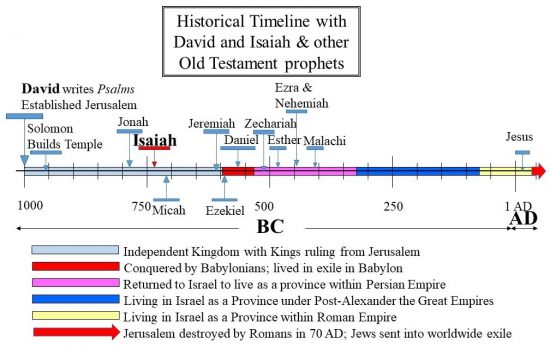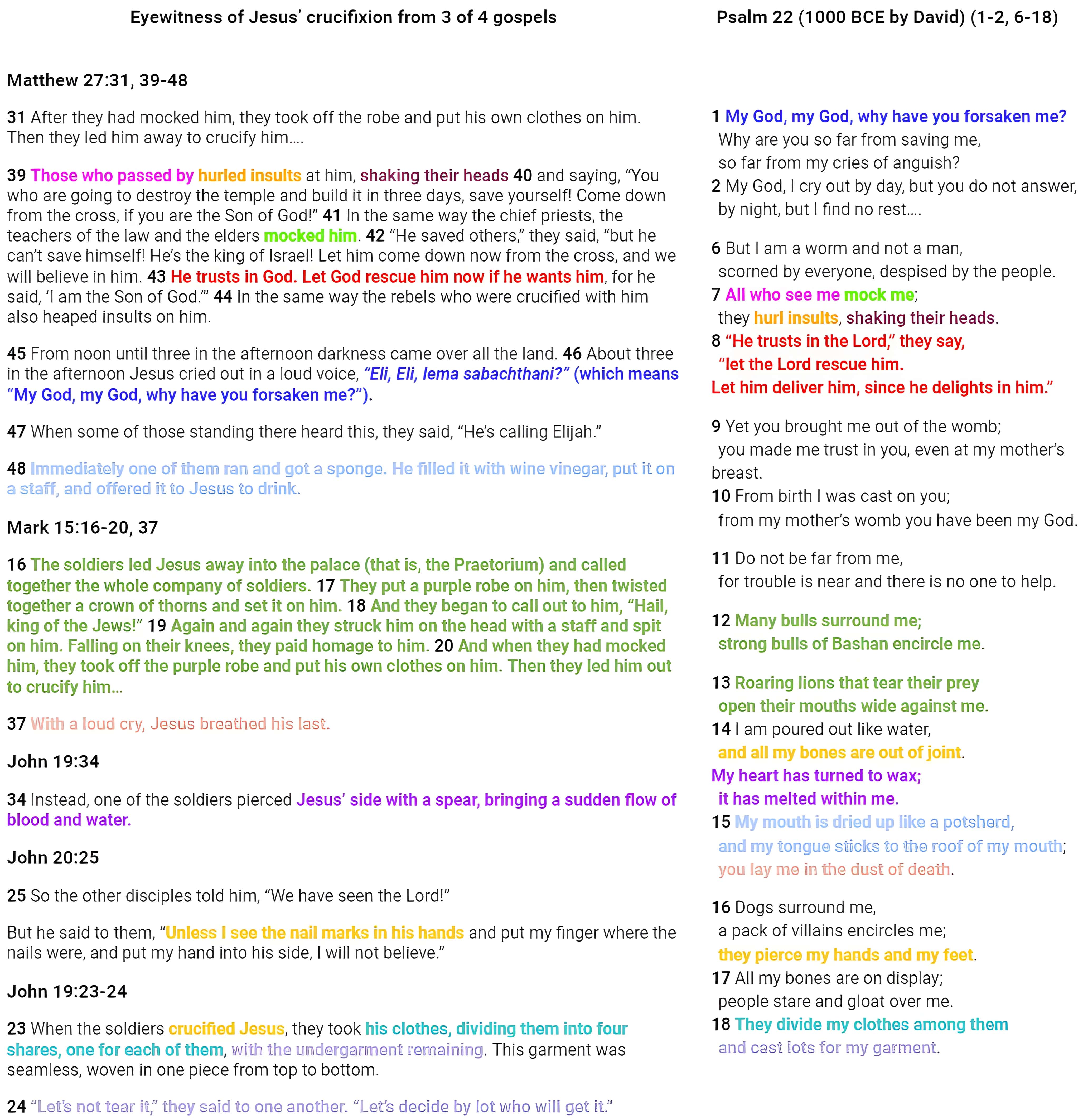A few years ago a work colleague, J, wandered to my desk. J was smart and educated – and definitely not a follower of the gospel. But he was somewhat curious so we had some warm and open conversations between us. He had never really looked at the Bible so I had encouraged him to investigate it.
One day he came into my office with a Bible to show that he was taking a look. He had opened it randomly in the middle. I asked him what he was reading. Our conversation went something like this.
“I am reading in Psalm chapter 22”, he said
“Really”, I said. “Any idea what you are reading about?”
“I guess I am reading about the crucifixion of Jesus”, J replied.
“That’s a good guess”, I laughed. “But you are about one thousand years too early. Psalm 22 was written by David around 1000 BC. Jesus’ crucifixion was in 30’s C.E. one thousand years later”
J did not realize that the Psalms were not the gospel accounts of Jesus’ life written by his contemporaries. Psalms were sacred Hebrew hymns written 1000 years before Jesus by inspired sages. J had only heard some stories about Jesus, including his crucifixion, and randomly opening his Bible, read what seemed to describe the crucifixion. Not knowing any better, he just assumed it was the story of the crucifixion which is remembered around the world annually on what is called Good Friday. We had a chuckle over his first mis-step in Bible reading.

Then I asked J what he saw in Psalm 22 that made him think he was reading about Jesus’ crucifixion. Thus began our little study. I invite you to consider some of the similarities J noticed by placing the passages side-by-side in a table. To help I have color matched the texts that are similar.
Comparison of Gospel accounts of the Crucifixion with the details in Psalm 22
That J made the logical but wrong conclusion that Psalm 22 was an eye-witness account of the Good Friday crucifixion, should make us ask a question.
How do we explain the similarity between the crucifixion accounts and Psalm 22?
Is it coincidence that the details match so precisely as to include that the clothes would be divided (seamed clothes were split along the seams and divided among the soldiers) AND have lots cast (if torn the seamless garment would be ruined so they gambled for it). Psalm 22 was written before crucifixion was invented but it still describes its various details (piercing of hands and feet, bones being out of joint – by being stretched as the victim hangs). In addition, the Gospel of John states that blood and water flowed out when the spear was thrust in Jesus’ side, indicating a fluid buildup around the heart. Jesus thus died of a heart attack. This matches the Psalm 22 description of ‘my heart has turned to wax’.
Psalm 22 was written as if Jesus’ crucifixion was being seen. But how so, since it was composed 1000 years beforehand?
God-inspired Explanation for Psalm 22
Jesus, in the Gospels, argued that these similarities were prophetic. God inspired Old Testament prophets hundreds of years prior to Jesus’ life to predict details of his life and death so that we can know that this was all in the plan of God. Prophetic fulfillment would be like having a Divine signature on these events of Good Friday since no human could foresee the future in such detail. This is evidence of God’s work and intervention in history.
Naturalistic Explanation for Psalm 22
Others argue that the similarity of Psalm 22 with crucifixion events of Good Friday is because the Gospel writers made up the events to ‘fit’ the prophecy. But this explanation totally ignores the testimony of historians from that time outside of the Bible. Josephus and Tacitus respectively tell us that:
“At this time there was a wise man … Jesus. … good, and … virtuous. And many people from among the Jews and the other nations became his disciples. Pilate condemned Him to be crucified and to die.” (Josephus. 90AD. Antiquities xviii. 33 Josephus was a Jewish Historian)
“Christus, the founder of the name, was put to death by Pontius Pilate, procurator of Judea in the reign of Tiberius” (Tacitus. 117 AD. Annals XV. 44. Tacitus was a Roman Historian)
Their historical testimony agrees with the gospels that Jesus was crucified. This is important because many of the details in Psalm 22 are simply particulars of the act of being crucified. If the gospel writers were going to make up the actual events to make them ‘fit’ Psalm 22 then they would basically have had to make up the whole crucifixion. Yet no one from that time denied his crucifixion, and the Jewish historian Josephus explicitly states that this is how he was executed.
Psalm 22 and Jesus’ legacy
Also, Psalm 22 does not end at v.18 as in the table above. It continues on. Note the triumphant mood at the end –after the person is dead!
26 The poor will eat and be satisfied; they who seek the LORD will praise him— may your hearts live forever!
27 All the ends of the earth will remember and turn to the LORD,
and all the families of the nations will bow down before him,28 for dominion belongs to the LORD and he rules over the nations.
29 All the rich of the earth will feast and worship; all who go down to the dust will kneel before him— those who cannot keep themselves alive.
30 Posterity will serve him; future generations will be told about the Lord.
31 They will proclaim his righteousness to a people yet unborn— for he has done it. (Psalm 22:26-31)
This is not talking about the details of events of this person’s death. Those details were dealt with in the beginning of the Psalm. The psalmist is now addressing the legacy of that person’s death with ‘posterity’ and ‘future generations’ (v.30).
Who would that be?
That is us living 2000 years after Jesus’ crucifixion. The Psalmist tells us that ‘posterity’ which follows this ‘pierced’ man who died such a horrible death will ‘serve’ him and be ‘told about him’. Verse 27 predicts the geographic scope of the impact – going to the ‘ends of the earth’ and among ‘all families of nations’ to cause them to ‘turn to the LORD’. Verse 29 predicts that ‘those who cannot keep themselves alive’ (since we are mortal that means all of us) will one day kneel before him. The righteousness of this man will be proclaimed to people who were not yet alive (the ‘yet unborn’) at the time of his death.
Psalm 22’s conclusion has nothing to do with whether the gospel accounts borrowed from it or made up the crucifixion events because it is now dealing with a much later era – that of our time. The gospel writers, living in the 1st century could not ‘make up’ the impact of the death of Jesus down to our time. They did not know what that impact would be.
One could not make a better prediction of the legacy of Jesus than Psalm 22 does. Even simply noting the annual worldwide Good Friday celebrations remind us of his global impact two thousand years after his death. These fulfill the conclusion of Psalm 22 as precisely as the earlier verses predicted the details of his death.
Who else in world history can make a claim that details of his death as well as the legacy of his life into the distant future would be predicted 1000 years before he lived?
Perhaps, like my friend J, you will take the opportunity to consider Psalm 22 in light of Jesus’ crucifixion. It will take some mental effort. But it is worthwhile because the man Psalm 22 foresaw promised:
I have come that they may have life and have it to the full (John 10:10)
Here is the entire gospel account for Good Friday that Psalm 22 foresaw and here its gift for you is explained.
